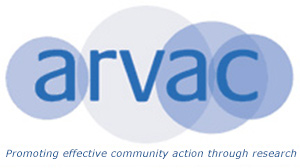John Diamond ( ARVAC trustee )
In March this year ARVAC hosted a Roundtable discussion on the challenges facing trustees supporting voluntary sector organisations . We invited a group of people who brought a range of different experiences and roles : everyone was involved actively in working with or supporting voluntary and community sector organisations where they lived ; some of their work had a regional or national remit . But everyone ( including ARVAC trustees ) on the call were active in their organisations and , in some cases , were trustees in one organisation and working for another . Collectively we had a lot of experience , expertise and insights into what was working ; what was difficult ; and what the challenges ahead might be .
There was a lot of agreement amongst us about the willingness of individuals to support their local or community based organisation. The willingness to volunteer as a voluntary helper was not in question . There was agreement too that when it worked well the experiences and activism that volunteers brought added energy and passion which were absolutely necessary to galvanise action as well as sustaining it . The added experiences and insights that activists brought were, also, part of ensuring that charities or groups had authenticity and legitimacy with the groups and individuals they worked with or supported. One of the lessons from the past two years has been , perhaps, that voluntary activism has been a critical part in supporting vulnerable individuals during lockdowns . In part we thought this was , also, indicative of ten years plus of austerity and the pressure on groups to fill gaps where previously public agencies had been present .
The difficulties presented to groups and charities was often one of securing and sustaining volunteers to be trustees . A combination of factors are in play here : from the legal / regulatory requirements of the roles and the accountability ( to outside bodies ) that goes with these formal roles alongside the time it takes ; the pressure on individuals to balance family life and needs with those of the ‘ professional ‘ or public roles we play ; the financial imperatives of securing funding ; and the ways in which there can be a drift away from the original purpose of the group and so, unintentionally, we find ourselves pursuing different needs ( often it was felt financially led ) and this can lead to real challenges and problems . A recurring theme was our recognition of the need to ensure trustee boards were more diverse in their membership and that this was both a necessity but also represented an opportunity for sustaining and reinvigorating groups too .
We , also, were mindful of a number of significant shifts too not just relating to finance and public policy choices from governments . There seemed to us to be four :
- Decline in trust : reflecting broader trends in a decline in public confidence with governments and politicians and particular problems associated with charitable sector appear to causing real issues . Is this to do with the sector appearing to be the ‘same as’ the public sector ? And is this because it has lost its ‘political ‘ edge ?
- Cumulative impact of austerity : the differential impact on the sector through austerity is important to understand alongside inevitable (?) growth consultants to advise on new funding streams and guidance on grant applications which shift the points of reference from members / users needs to funders and commissioners .
- Inflationary costs and their immediate and medium term impact : as inflation rises and very particular costs associated with utilities go out dramatically we are entering new territory for all organisations . Not just about financial and budget management skills but , also, for trustees and boards how to ensure alignment with values and principles as well as financial survival .
- The presence or absence of the academy : ARVAC’s founding roots were in a joint initiative between activists in the sector and committees academics . The HE Sector has a significant part to play and , despite many and current initiatives , yet experience is mixed and uneven not just between universities but within them .
Looking Ahead – Opportunities and Challenges
There were a number of important shared observations about how important the sector was in contributing to the democratic process and representing a critically important strand of political and local activism inspired by principles and values of social good . The strength of local, grassroots and neighbourhood based groups providing practical support and guidance cannot be underestimated. It’s a sector which is genuinely and creatively diverse and , sometimes , might seem to be resistant to being co-ordinated or managed. Resistance to outside imposition to engage with consultations can be seen as being messy and unpredictable but , can, also be valued as demonstrating independence and autonomy which are real strengths .
There were some very immediate challenges ahead : the intersection of care and austerity ; creating an environment which values mutuality ; linking sector values with those focussed on local economic development as alternative to austerity; community wealth building and sustaining small organisations which lack trustee support and , all of these are taking place in highly contested and restricted spaces .
What next
We agreed to share this summary of the discussion . We , also, recognised the genuine value of supporting spaces where such conversations can take place . Many of us recognise that these contested and restricted spaces are , partly, a consequence of the issues as well as the financial imperatives impacting on the sector . This is why promoting , supporting and helping to sustain ways of working which value mutuality and trust are so important .
